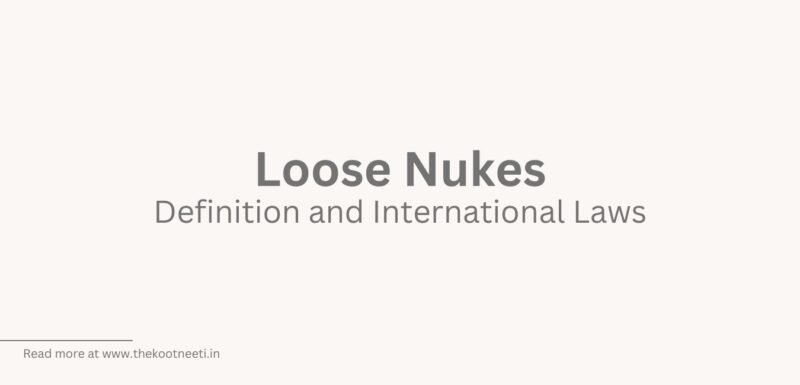Loose Nukes: Definition and International Laws

Loose nukes refers to the potential proliferation of nuclear weapons and materials to countries or groups that are not recognized as nuclear weapons states by the Nuclear Non-Proliferation Treaty (NPT). The term “loose nukes” is often used to refer to the risk of nuclear materials or weapons falling into the hands of terrorists or other non-state actors.
The proliferation of nuclear weapons and materials is a significant concern in international relations, as it can lead to the spread of nuclear weapons and increase the risk of nuclear conflict. To address this risk, there have been efforts to secure and control nuclear materials and to prevent the proliferation of nuclear weapons and technology to non-state actors.
Efforts to prevent the proliferation of loose nukes include international agreements and initiatives such as the NPT, the International Atomic Energy Agency (IAEA), and the Global Initiative to Combat Nuclear Terrorism. These efforts aim to promote the peaceful use of nuclear technology, to prevent the spread of nuclear weapons, and to secure and control nuclear materials.
International Law
There are a number of laws and international agreements that aim to prevent the proliferation of nuclear weapons and materials and to ensure that they are adequately secured. Some of the key laws and agreements related to loose nukes include:
- The Nuclear Non-Proliferation Treaty (NPT): The NPT is an international treaty that aims to prevent the proliferation of nuclear weapons and to encourage disarmament. It requires states to refrain from transferring nuclear weapons or materials to other states or non-state actors, and it establishes international safeguards to verify that states are complying with these obligations.
- The International Atomic Energy Agency (IAEA): The IAEA is an international organization that works to promote the peaceful use of nuclear energy and to prevent the proliferation of nuclear weapons. It conducts inspections and verification activities to ensure that states are complying with their obligations under the NPT and other international agreements.
- The Comprehensive Nuclear-Test-Ban Treaty (CTBT): The CTBT is an international treaty that prohibits states from conducting nuclear test explosions. It aims to prevent the proliferation of nuclear weapons by banning states from developing or testing new nuclear weapons or improving existing ones.
- The Global Initiative to Combat Nuclear Terrorism (GICNT): The GICNT is a partnership of over 100 countries that aims to prevent nuclear terrorism by strengthening the global nuclear security architecture and enhancing cooperation between states.
There are a number of laws and international agreements that aim to prevent the proliferation of nuclear weapons and materials and to ensure that they are adequately secured. These laws and agreements play a critical role in reducing the threat of loose nukes and promoting global nuclear security.


















